Do you need an FAQ? - A Frequently Asked Question.
Picture this...
You're sitting in a meeting about a new website, the designs are finalised, the dev has built all the page templates and most of the pages have been decided, then the question comes up,
“what about the FAQ page?”
Something in you twigs, you’ve seen the data while preparing for this new website and you respond
"actually the current one doesn’t get a lot of traffic”.
There’s surprise, clearly nobody was expecting that response, after a second the head of sales replies
“well everyone else has one, we surely need it, why would everyone have FAQs if they weren’t important?”.
You’re stumped, I mean they’ve got a point...
What is a website without an FAQ after all? A web page dedicated to answering every single question a lead or potential customer could possibly ask and can be regularly referred back as a resource. In theory, an FAQ page is a great idea, but like so many ideas that are great in theory, when put into practice is there more than meets the eye?
The Case to Scrap the FAQ
As an SEO, it’s rare that we see FAQ pages rank. The range of questions that an FAQ page seeks to answer, the specificity of many questions to the particular business, and lack of supporting content to really explore any topic in depth mean that catch-all FAQs don’t rank well in search. Even when they answer a specific query particularly well.
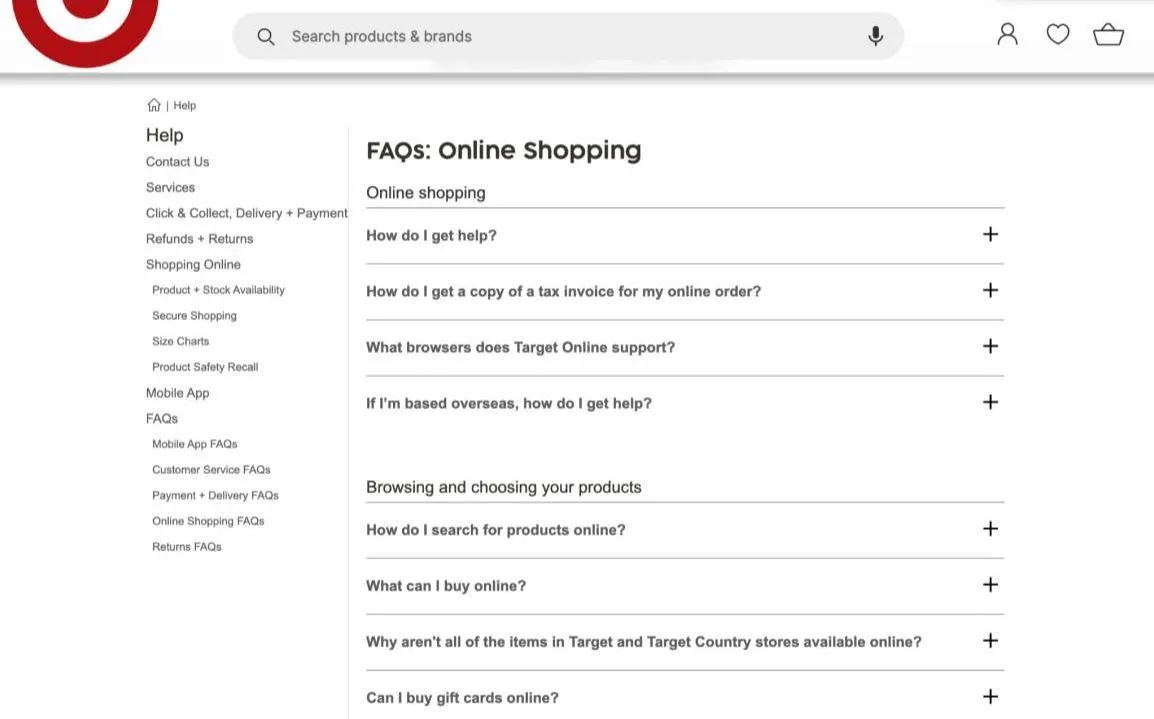
From an SEO’s perspective we love scrapping FAQ pages and moving specific questions to more popular landing pages that directly cover the topic. The benefit is three-fold:
- The additional content improves the landing page, giving more detailed information for users and search engines to crawl on a particular topic
- FAQ schema can then be added to that landing page, meaning two questions can appear underneath our landing page in search, giving us more real estate and making us stand out against competitors
- The likelihood of becoming a featured snippet for those specific questions is increased, as landing pages are more likely to be used for this search feature than FAQs
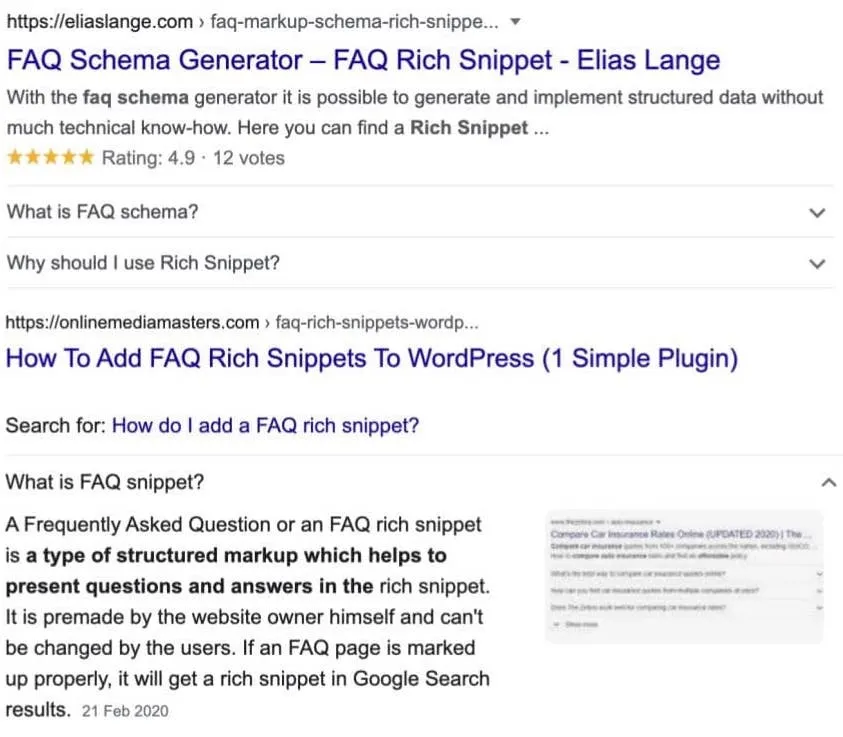
Won’t Somebody Please Think of the User Experience?

While from an SEO stand point, moving questions from an FAQ leads to stronger landing pages that can help drive more traffic to the site from search, the question has to be asked, what about user experience?
For many digital marketers more focused on lead nurturing and customer engagement, an FAQ page makes sense. Actual leads have a wide range of questions and creating a dedicated resource with the most common questions they have is a no brainer. In terms of a second step interaction, it makes intuitive sense.
However, plenty of things intuitively make sense that don’t pan out in the real world, such as telling a determined client when they’re wrong, running away from an angry bear and swimming against a rip (one of those three things can be fatal). So the question becomes, what does the data say? Is an FAQ page; like other core pages, crucial to a successful website despite not ranking well (such as an about us or contact page), as they aid in a sale or lead conversion?
Stats about FAQs: A couple of Facts
Using some of Optimising’s favourite clients*, I decided to evaluate the performance of FAQ pages from an UX perspective. Using the data from the general FAQ pages of 15 clients, we assessed engagement metrics like page views, bounce rate and exit rate. This was then compared to total values and to other key pages vital for a positive user experience, such as ‘contact’ and ‘about us’ pages.
The results surprised even us:
- FAQ pages accounted for less than 1% of pageviews across all industries
- Bounce rates across FAQ pages were 20% higher on average
- Exit rates were lower, indicating that users would go on to further interact with a website from FAQs compared to other pages
*okay I’ll be honest here, I looked at the ones that had strong data for the last two years and an FAQ page, don’t get me wrong we like you but we’ve scrapped a lot of FAQs in our time
FAQ Page User Metrics
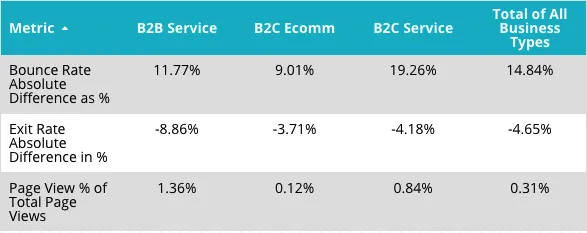
About Us Page User Metrics
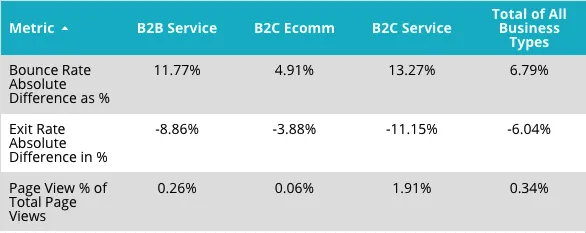
*Note: one B2C client had no About page and was excluded from the data
Contact Page User Metrics
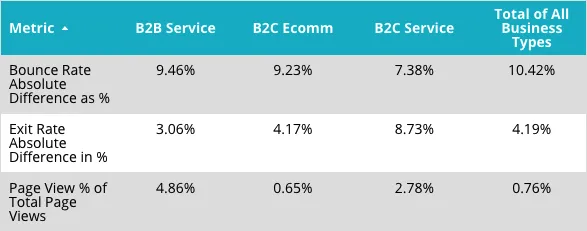
*Note: one B2B client had no Contact page and was excluded from the data
Interestingly from the data above, we saw for client sites where page views were above 1%, they either lacked service/product specific landing pages or had a highly technical product/service that was relatively new to the market.
Ultimately, FAQ page views were lowest on ecommerce websites, but surprisingly, B2B and B2C Services websites only performed marginally better.
The Numbers Mason, what do they mean?

To summarise this data tells us two key things:
- Users aren’t really using FAQ pages in general (as a landing page, first, second or third interaction)
- While for B2B service clients the number was greater than 1%, with a sample of two this isn’t very reliable.
You might be wondering why the sample size is so low for B2B service clients and honestly the answer is that of the 100+ Google Analytics accounts we have access to, and the ~50 BSB Service websites I checked, only 3 had a FAQ page, so maybe B2B business owners have already conceded that a general FAQ isn’t necessary.
What’s interesting is while general FAQs were barely used by visitors across all business types; the about us and contact us page were equally as useless for B2C Ecomm sites; however FAQ’s still had the lowest total page views and highest bounce rates across the entire sample analysed.
Given the above insight is there a case to scrap those as well for B2C eCommerce sites? Well that depends, an about-us page is as much a branding exercise as it is anything else, while a contact us page can have benefits for local SEO (especially if you have physical store fronts). I’d argue there might be secondary benefits to these pages that a FAQ simply doesn’t offer and unlike a FAQ, the content of these pages can’t really be moved to other areas of the website.
So should you scrap the FAQ?
Based on the user data above, FAQ’s don’t seem to be overly valuable from a UX point of view for any business type and I’d argue this is because of how people search and find information. If you have a business that has multiple services or products, why would I not navigate to the product or service page to try and answer my question first? While we all know what a FAQ is, it’s less obvious that my specific question will be answered there.
Why? Well in many ways it’s conditioning, in general humans always pick the most obvious answer and when we have a question on Service A, the page called Service A makes more sense immediately to us than a page called FAQ (trust me I studied Psychology and remember about 5% of the degree).
It seems obvious, but one might argue that an FAQ is needed for when the question is more broad or about the company. Well, from the above either users aren’t asking a lot about companies or maybe everything they need to know is in other places. It’s probably most likely that those questions come later in the buying cycle and are probably answered by a human or a clever lead nurturing program.
So do we need to keep the FAQ page? Overall it’s a resounding no, but remember how I said there were three B2B service websites that had an FAQ? The third one was excluded from the above analysis, as it was a real outlier and worth discussing in it’s own right. This B2B website highlights some of the vital conditions where a general FAQ might be necessary or even vital and even shows a great use case of how you can configure these pages for search.
The Little FAQ that could
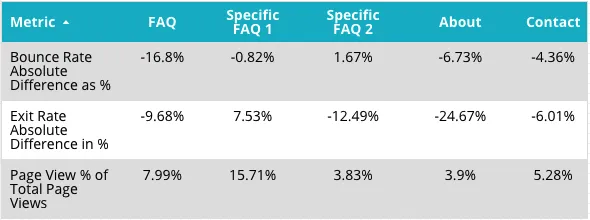
For this site, the FAQ page visits made up nearly 28% of all page views, and had a lower bounce rate and exit rate. A key strength was the specific FAQs related to key areas of their business and these perform like landing pages in search. While these pages are well optimised and are linked to from the menu and other parts of the website there are 4 factors about the product/service the client sells which means there’s a strong case for an FAQ, and the user data backs that up.
The 4 Conditions where a FAQ Page Might Make Sense
1. Product or Service Complexity
If you’re selling a product or service aiming to satisfy many user needs, or offer a holistic solution, then an FAQ might make sense. Often if your product or service does not directly address a specific problem, or is an indirect solution then FAQ’s can be a great way to address those pain points.
2. Product or Service Age
New products or services are likely to have little information online and users aren’t likely to be aware of it as a solution. They’re probably going to have a lot of questions, so an FAQ may be an efficient way to address this. However if the product or service is relatively straightforward, then skip the FAQ and put the questions on the most appropriate landing page.
3. Industry Complexity/Purchaser Awareness
Even if you’re in an established industry with an established product or service, if you operate in an industry that users are likely to have no awareness or understanding of, or it’s a purchase they’re likely making the first time or highly infrequently then an FAQ might make sense. In some areas like medicine as well, you may be obligated to have an FAQ page.
4. Product Reliance on other Products or Services
If you’re selling a product or service that integrates into a third party product or service, or is reliant on a third party service, then having an FAQ to explain that may make sense and could even link to a knowledge base.
So the next time someone asks ‘do we need an FAQ page’ embrace your inner SEO and hit them with the ole ‘it depends’. While in general FAQ pages are relatively useless and not needed (I mean why would we build a page that has less than 1% of all page views, purely because everyone else is?), there are certain conditions where an FAQ page makes sense.
Remember, even if all your competitors have flashy FAQ pages, for most businesses (whether B2C or B2B) it's not needed. Save yourself and your team the heartache of building something unnecessary and buck the trend by putting those common questions on the most relevant landing pages. Your SEO and users will thank you.



